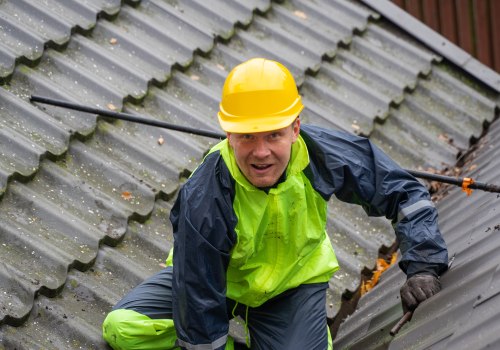Use the 70% Rule to Plan Your Budget · 3.Assess Your Skill Set · 5.If you don't have cash available for the project, you'll want to get pre-approved for a loan. To do this, you will need a good credit rating and the bank may require a 20% down payment or some type of guarantee. If everything goes according to plan, you can expect to spend a minimum of 6 to 12 weeks in the process of buying and exchanging a home. However, if the remodeling process is delayed or if you need approval from a third party to purchase the property, this process could be delayed by several months.
Rocket Mortgage, 1050 Woodward Ave. So how do you flip a building or a house? In simple terms, you want to buy cheap and sell high (like most other investments). But instead of adopting a buy-and-hold strategy, you complete the transaction as quickly as possible to limit the amount of time your capital is at risk. In general, the focus should be on speed rather than maximum benefit.
This is because each passing day costs you more money (mortgage, utilities, property taxes, insurance, and other costs associated with owning a home). That is the general plan, although it comes with several pitfalls. Before you bid, make sure you know the highest price you can pay for a home and still make a profit. This includes your estimate of repairs, interest and taxes.
Remember to fill your budget by 20%. If the homeowner or bank doesn't sell to you for this price, leave. It's better to keep looking than risk going bankrupt because of a bad investment. The number one rule for moving houses is to have a plan.
You must go through the entire process and plan each step before investing in a home. Do research, talk to experts, practice your negotiation skills, carpentry, plumbing, etc. According to experienced flipper Ben Mizes, “The worst way to learn to go around houses is to lose 100,000 in a roll. So Plan Ahead, Plan Well, and Protect Yourself.
When Felipe approached me after dinner one night to tell me that he wanted to be a real estate investor like me, I told him that the news called for a celebration. I had long known that my son-in-law was interested in buying, rehabilitating and reselling houses, thanks to my daughter, Jenna. But, I was waiting for Felipe to say something. This is how I would know I meant business.
And, when he presented me with the research he had already done on house-change training programs, it was obvious that it was more than serious, I was eager to get going. Always ready to help, I went through his list and helped him narrow down his options to the best training available to real estate investors. Fortune Builders offers two-hour introductory courses in various locations around the country for free, after which you can choose to sign up for one of their most intensive three- or four-day boot camps. They also offer home-study courses on topics such as generating leads and evaluating repair costs, workshops that include information on how to raise money and use tax strategies, and personalized advice to help you take your general investment education and business to the next level.
Freedom Mentor allows you to try one of their online video courses for free, then request to be an apprentice and receive the rest of your educational materials free of charge, or pay for a comprehensive training curriculum plus an investment certification. The list of courses is extensive and includes everything from how to find motivated leads to how to finance your first offers. Therefore, it is possible that once you have completed your studies you will have a full understanding of how to change houses. If you are chosen as an apprentice, you will not only receive your free instruction, but you will also receive a mentor and a real estate partner to get started.
Are you considering moving homes in California? You've come to the right place. This cheat sheet quickly brings you up to speed on the basics of changing the house and helps you overcome the most common obstacles. The idea is to refresh the house to give it a nice, clean and well-kept look. You want the house to be in “move-in” condition and live up to market standards.
In many cases, the longer the seller endures, the harder it is to sell the house and the more desperate the seller becomes. This cycle may indicate a buying opportunity now or in the near future. Your agent can tell you the average time a home is on the market in a given neighborhood so that you can properly assess what is considered a “long time”. Many anxious and ill-informed investors get too enthusiastic about the big picture and lose sight of the critical details that can make or break a deal.
They pay too much for a property, underestimate the cost of repairs and renovations, don't inspect a property or research the title, or sign contracts they don't fully understand. Take a look at these ten common mistakes that will help you avoid costly mistakes and maximize your profits right from the start. Like the stock market, the housing market has its ups and downs. In a hot market, investors are often infected with irrational exuberance, the belief that current appreciation rates are an accurate representation of future rates.
They overpay for properties, expecting them to appreciate, and when the market flattens or sinks, they are left with a property that they need to sell at a price that no buyer is willing to pay. Take a final tour half an hour before closing to make sure the house is still in the same condition you last saw it and that everything you expect to be included in the sale remains on the property. I toured the houses before closing and discovered that the seller took all the appliances when those items were supposed to remain in the house. Work to resolve any issues before closing, you have no recourse after that.
Another possibility is for a landlord to try to sell you a home without telling you that the property has multiple liens against you. Unless you research the title and ask the title company to perform a title search, you can't be sure that the title is clear or even valid, or that the person selling the home legally owns it. And, if you're not 100% sure, don't buy the property. Transforming a bungalow into the Taj Mahal may be a noble vision, but it ultimately leads you to the house of the poor.
Get to know the real estate market in your area and regularly visit open houses to keep abreast of current trends and market demands. Evaluate repairs and renovations to meet or slightly exceed what is currently sold in your area. Your renovated home should be more attractive than comparable homes in the area, but not excessively more attractive. In the wave of change, it's easy to bypass taxes, especially property taxes.
However, forgetting to pay your taxes can further complicate your exchange transaction, and back taxes and penalties can take a large part of your future earnings. Dummies has always championed complex concepts and made them easy to understand. Dummies helps everyone have more knowledge and confidence in the application than they know. Whether it's passing that big test, qualifying for that big promotion, or even mastering that cooking technique, people who rely on fools rely on him to learn the critical skills and relevant information needed for success.
Every project is different, but with some experience, you can learn to estimate the costs of many home renovations and get an idea of whether a particular home is a good buy or not. Harvard Extension School at Harvard University offers two program formats for learning how to buy, rehabilitate, and resell property, and you get a certificate of completion at the end of either. This shouldn't come as a surprise: if you're interested in moving a home full-time, you need to know the ins and outs of real estate. If you're thinking about moving a home, make sure you understand what's needed and the risks involved.
Now you have to pay your own rent or mortgage, plus your folding property mortgage, as well as utilities, home insurance and property taxes. We'll also cover the legality of invested properties, the best cities to invest in, and how to finance this investment (even if you don't have money or bad credit). Having a keen eye for design and being able to imagine what a space might look like is an invaluable skill for a home changer, as it will ultimately lead to the greatest increase in value for the lowest additional cost. However, it's possible to change houses successfully if you take the time to learn how to do it the right way.
Thanks to a bit of luck and some serious persistence on his part, he ended up on an HGTV show about flipping houses, where he appeared in several episodes as part of an Atlanta investor team. And you also have the option of learning online or via live streaming if you can't afford to be constantly away from work or family while you're in training. Having all of these people in line will save you a considerable amount of money and stress and allow you to immediately jump into your change project as soon as you take office. Illegal change of property is similar to loan or mortgage fraud, except this time, the fins inflate the price too much thanks to a dishonest mortgage broker or appraiser, and then sell the house to an unsuspecting buyer.
If you're new to home renovation and have a low budget, you can save yourself some money by buying sweat capital. If you've just started buying and exchanging houses, then you probably realize that there's a lot to learn. . .



